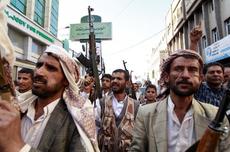A proposal to transfer control of a Red Sea port could have wide-ranging effects on regional tension. If President Trump travels to Riyadh later this month, as reported, he will find that the six leaders of the Gulf Coordination Council GCC countries hold widely divergent views on Iran, the extent of the Iranian threat, and how to resolve the conflict in Yemen. This divergence has made it difficult to coordinate on a policy to challenge Iran’s bad behavior without tipping the region into open conflict. So far, such efforts have focused on improving regional defense capabilities and U.S.-GCC security cooperation. In particular, the Trump administration has indicated it will help the Saudi-led coalition fight the pro-Iranian Houthi insurgency in Yemen by providing advanced munitions as well as logistics and intelligence support.
But Oman has been a particularly reluctant partner in the GCC’s desire to confront Iran, and even the other non-Saudi GCC states favor a reduction in regional tensions. Iranian President Rouhani and Foreign Minister Zarif are maneuvering to exploit these rifts, seeking to isolate the Saudis from their smaller Gulf partners. But Iran itself is beset by internal policy differences over how to deal with the Gulf states. And as presidential elections approach, Rouhani is aware that heightened regional tensions weaken his hand with the hard-liners who surround Ayatollah Khamenei. Cooling the temperature in the Gulf could be his best bet to secure re-election.
Yemen may be the key to solving the GCC’s Iran problem. After last year’s Kuwait round of Yemeni negotiations ended in stalemate, the Saudi-led coalition determined that only a shift in the military balance would bring the Houthis and their allies, loyalists of former President Ali Abdullah Saleh, back to the negotiating table. A strategy was derived to push the Houthis off the Red Sea coast, the Yemeni terminus of the arms-smuggling route that begins in Iran and seize the vital port of Hodeidah.
More recently, however, concerns over the complexity of a military operation to drive an entrenched force from a city of at least one million people has led the coalition to re-consider its position. Yemen’s Hadi government, along with the Saudis and Emiratis, is signaling its willingness to accept a peaceful transfer of the city and port to a neutral third party. That party would be responsible for repairing damaged port facilities, allowing unfettered access to humanitarian relief organizations, and ensuring that the port would no longer be used for arms smuggling. There are encouraging signs that Houthi and Saleh forces may agree to this proposal.
Even more importantly, an agreement among the parties to transfer control of the port to a neutral party might spark a return to UN-led negotiations. UN Special Envoy Ismail Ould Chaikh Ahmed is seeking an agreement among the parties to allow the government to return to the capital, Sana’a, and resume functioning while negotiations continue over restructuring the interim government and concluding the political transition under the terms of the GCC Initiative. A side agreement to restore functionality to Yemen’s Central Bank could pump billions of Yemeni rials into the economy and help ordinary Yemenis provide for their essential needs.
Oman, which alone among the GCC states has maintained a continuing dialogue with the Houthis, can play an important role in pressing for this outcome. Moreover, Oman’s constructive relationship with Iran can also be an important lever to secure Iranian tacit cooperation. Although Iran doesn’t “control” the Houthis, Iran’s encouragement to respond positively to the coalition initiative and agree to work with the UN Special Envoy can tip the scales toward the desired outcome. Using Omani diplomacy to achieve broader GCC goals in Yemen, and to ensure that the country is not a continuing source of instability and insecurity in the Arabian Peninsula, can thus contribute to reconciling disparate GCC views on managing Iran while bringing Yemen’s two-year old conflict to a peaceful conclusion.
Defense One
خليك معنا

